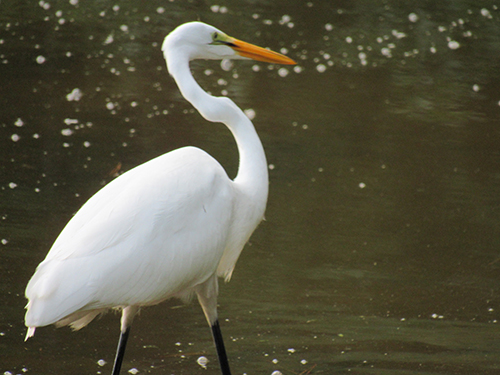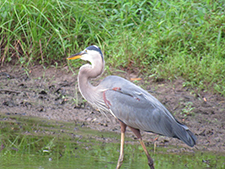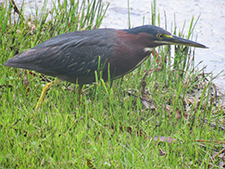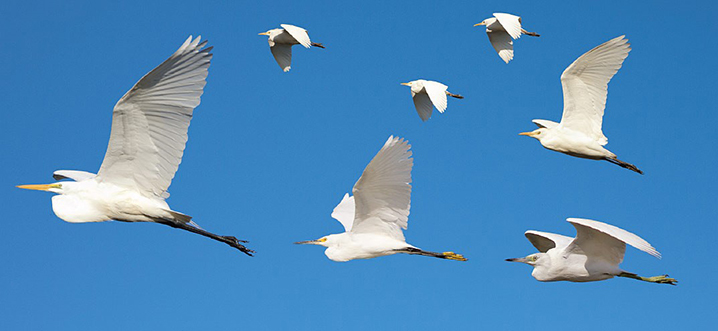Please Step Forward and Identify Yourself?
By Bill Willis
October 5, 2018

Photo courtesy of Bill Willis
On a peaceful summer day in 2018 a new bird was observed on Discovery Lake. The white bird displayed a certain grace and elegance as it made calculated steps in the shallows. With its neck outstretched and head extended, it would quickly plunge its beak below the surface of the water. A fish was often its reward.
The following avian account is true and substantiated by first hand sightings. Could employees see the same bird differently, but still agree? By the end of this discourse, there will be a better understanding of what was seen.
Discovery Lake has long hosted both Great Blue Herons and smaller Green Herons. In recent years, the Green Herons have nested twice and produced four young. There’s no evidence that the Great Blue has nested despite two adults being on campus. Therefore, is the new bird a Heron or not? The answer may not come easily.

Photo courtesy of Bill Willis

Photo courtesy of Bill Willis
Compare the Egrets and the Herons. Bear in mind that names can be localized and interchangeable and that there are sixty species globally.
| Feature | White Egret | White Heron |
|---|---|---|
| Legs | long, black, dark | long, pale greyish yellow |
| Feet | black | black |
| Neck | long | long |
| Bills/Beaks | harpoon-like, long orange-yellow | harpoon-like, long, thick stout mostly yellow, with black |
| Plumes on head crest | no, some young | yes |
| Shoulder patch | none | dark blue |
| Size, relative | smaller than Heron | larger, heavier than Egret |
| Where found | fresh and salt water lakes, ponds, swamps | lakes, ponds, swamps |
| Breeding, Global | Central and South America, Africa, Europe | South America, Florida |
| Breeding, USA | both coasts, north into Southern Canada Florida | Panhandle only |
| Distribution, NIEHS (Birds EPA) | yes | no |
| Flocking | heterogeneous with Herons | solitary |
| Family | Ardeidae | Ardeidae |
| Genus | Ardea and Egretta | Ardea and Egretta |
| Color | bright white can vary | can vary, even dull white |
| Decorative plumes | yes, breeding | none |
| Swimming | no | no |
| Flying posture | retracts neck on short flight | retracts neck in flight |
| Food preferences | carnivorous | carnivorous |
| Diet | fish, amphibians, reptiles, insects, crustaceans, small birds | fish, amphibians, reptiles, insects, crustaceans, small birds |
It turns out that the herons and egrets don’t have strong, distinctive and specific traits that would allow this group of birds to be distinguished apart. Immature, pre-breeding and mature bird plumage can falsely resemble other species, so the season and age must be a factor. Therefore, members of the family Ardeidae are often collectively called herons. Nesting range limits (Florida) may be key.
Conclusion
Having compared our visitor with published articles, we conclude that our mystery bird is a Great White Egret rather than the locally much rarer Great White Heron. The very white plumage, yellow bill, black legs, rarity of the Great White Heron north of Florida, and smaller size compared to the Great Blue Heron, supports this identity of Great White Egret/Heron.
The author would like to acknowledge the research assistance provided by Nora Weston, Access Services Librarian.
Give It A Try: How Many "Heron Species" Can You Find in These Images?

Photo courtesy of Composite; photos by George Armistead and Brian Sullivan



